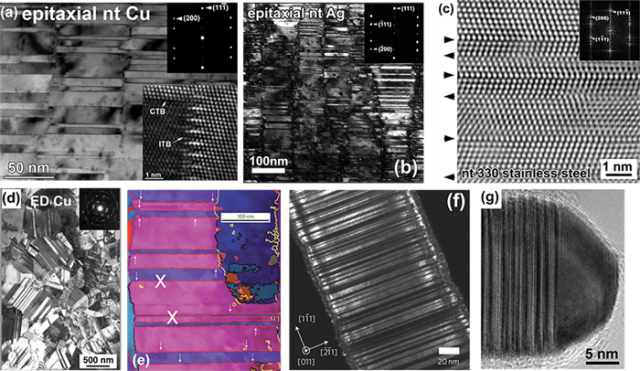Jun 23 2014
Dr. Xinghang Zhang, associate professor in the Department of Mechanical Engineering, recently published a review article, titled “Growth twins and deformation twins” in the May issue of Annual Reviews of Materials Research (2014). The journal has an impact factor of 16 and is well recognized in the Materials Science community.
 Bright-field transmission electron microscopy (TEM) images of magnetron sputtered (a) epitaxial nanotwinned (NT) Cu, (b) epitaxial NT Ag (20), (c) polycrystalline NT 330 stainless steel films (arrows indicate the location of twin boundaries), and (d) electrodeposited (ED) NT Cu (14). (e) EBSD image of a defective twin boundary in sputtered NT Cu (X indicates a twin boundary that has defects—the so-called defective twin boundary). ( f ) Extremely fine twins in ED NT Cu nanopillars. (g) NT Au nanowires. Abbreviations: CTB, coherent twin boundary; ITB; incoherent twin boundary.
Bright-field transmission electron microscopy (TEM) images of magnetron sputtered (a) epitaxial nanotwinned (NT) Cu, (b) epitaxial NT Ag (20), (c) polycrystalline NT 330 stainless steel films (arrows indicate the location of twin boundaries), and (d) electrodeposited (ED) NT Cu (14). (e) EBSD image of a defective twin boundary in sputtered NT Cu (X indicates a twin boundary that has defects—the so-called defective twin boundary). ( f ) Extremely fine twins in ED NT Cu nanopillars. (g) NT Au nanowires. Abbreviations: CTB, coherent twin boundary; ITB; incoherent twin boundary.
Zhang and his colleagues, Irene J. Beyerlein and Amit Misra from Los Alamos National Labs, reviewed studies on nanotwinned metallic materials. Nanotwins were shown to induce numerous unique properties in metallic materials, including high strength and ductility, high temperature thermal stability and superior radiation tolerance.
Zhang’s research team, the Nanometal Group has been working on mechanical behavior of nanotwinned metals since 2004. His research on nanotwinned metals is currently supported by the DoE-Office of Basic Energy Sciences, under grant no. DE-SC0010482.